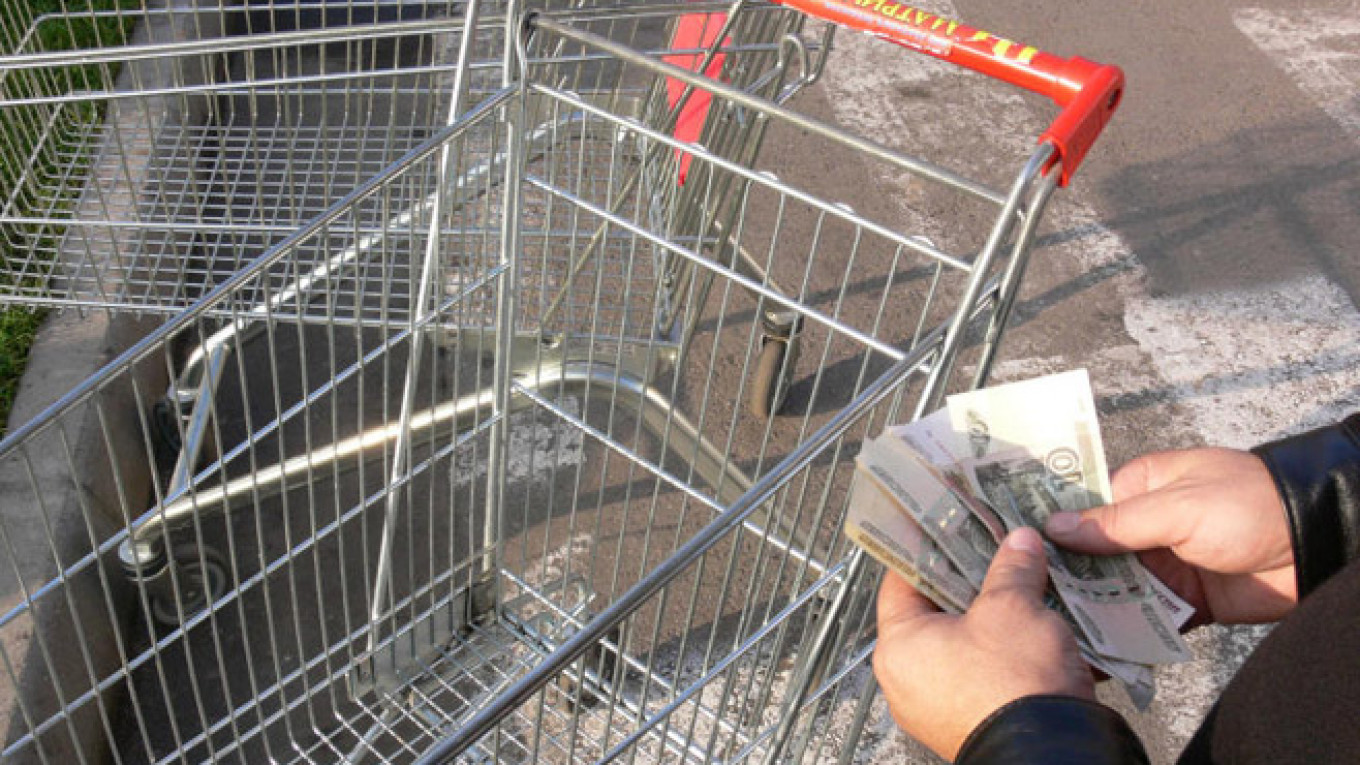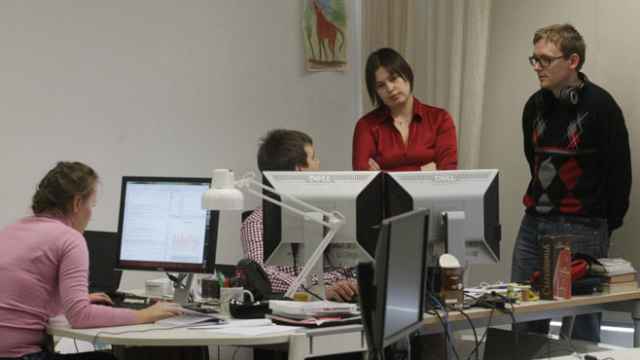Standing on tiptoe, Galina Abdullina strained to reach the back of the top shelf to get one of the last tubs of discounted smetana, the sour cream beloved by Russians.
She said she had come to this branch of Pyatyorochka, a budget supermarket chain, after purchasing just a loaf of bread in a nearby upmarket shopping center in northern Moscow where prices have risen rapidly.
"It's terrible," said Abdullina, 77, who spent her working life as an employee in Soviet department stores GUM and Detsky Mir. "We go there to look at things, and here to buy."
Abdullina is one of millions of Russians hit by rising prices in the wake of Russia's August ban of food imports from the European Union and United States, a tit-for-tat response to Western sanctions imposed on Moscow for its support of separatist rebels in eastern Ukraine.
Climbing food prices have fueled annual consumer inflation that reached 8 percent in September, its highest level for three years.
Expensive Food
Price rises since President Vladimir Putin signed a decree halting EU and U.S. agricultural produce imports on Aug. 6. have been particularly rapid for meat, fish, dairy products and, despite a good harvest, fruit and vegetables.
The cost of meat and poultry jumped 16.8 percent in September, fish and seafood by 14.1 percent, dairy products by 16.2 percent and fruit and vegetables by 6.1 percent.
"Meat is very expensive," said pensioner Galina Maurova, who was shopping at budget supermarket Dixy by the Babushkinskaya metro station in northeastern Moscow on Monday.
Price rises have continued unabated this month.
Between Oct. 7 and Oct. 13 the cost of salami, sausages, hot dogs, tinned meat, smetana, milk, cheese and caramel has climbed by 0.4-0.6 percent, according to Russia's State Statistics Service. In the same period the price of cucumbers shot up 10.9 percent and tomatoes by 5.7 percent.
Not Just the Poor
The effects of inflation, however, are not only being felt by those with limited budgets.
Browsing the shelves at elite supermarket Aliye Parusa in downtown Moscow, Yury, 63, picked out fruit, vegetables, meat, and dairy products as the fastest price risers. But he was particularly horrified by the speed with which fish prices had shot up.
"The price of fish is monstrous," he said. "I am trying to decide how to change my shopping behavior."
Over 50 percent of middle-class Russians noticed either food price rises or a lack of goods on shop shelves between July and September, according to a survey by Sberbank CIB released earlier this month.
Even government ministers have commented on their rising food expenses. Deputy Prime Minister Arkady Dvorkovich, who said he goes shopping once a week, told reporters last month he was spending up to 20 percent more on food than at the beginning of the year.
Inflation remains a big concern for Russian people, many of whom remember watching with horror in the late 1990s as runaway price rises wiped out their savings. Russians picked inflation as the most serious problem for the country ahead of utility services, corruption and alcoholism in a survey published Aug. 12 by state-run pollster VTsIOM.
Top Concern
Food price rises have been the key factor behind inflation, but it has also been driven by a steady devaluation of the ruble.
The Russian currency repeatedly touched record lows this month, and has shed over 20 percent of its value against the dollar since the start of the year. The weak currency makes imports more expensive, increasing costs for Russian retailers.
Officials originally planned to bring inflation down 5 percent in 2014 — an increasingly distant goal as investors were spooked by the Kremlin's role in Ukraine and falling oil prices accelerated the ruble's tumble.
In a bid to rein in price rises, the Central Bank has hiked interest rates three times this year despite a flagging economy.
The state could impose price controls on 40 "socially important" goods if they rise in price by more than 30 percent, Trade and Industry Ministry Denis Manturov said in an interview with state-owned Rossiiskaya Gazeta published on Oct. 9.
'Just One' Bag of Groceries
Central Bank Chairman Elvira Nabiullina has said that inflation will be at least 8 percent this year, and some experts are predicting that consumer prices will continue to rise into 2015.
If the oil price trades between $90 and $95 a barrel then inflation will peak at 9 percent year-on-year in the first three months of 2015, analysts at VTB Capital said in Oct. 6 research note.
"We expect the effects from the food import ban to begin to dissipate from the second quarter next year," said Dmitry Polevoy, chief economist at ING in Moscow.
While inflation remains high, Abdullina in the budget supermarket in northern Moscow said she will simply be buying less.
"I used to get two shopping bags of groceries. Now I just buy one," she said.
Contact the author at h.amos@imedia.ru
A Message from The Moscow Times:
Dear readers,
We are facing unprecedented challenges. Russia's Prosecutor General's Office has designated The Moscow Times as an "undesirable" organization, criminalizing our work and putting our staff at risk of prosecution. This follows our earlier unjust labeling as a "foreign agent."
These actions are direct attempts to silence independent journalism in Russia. The authorities claim our work "discredits the decisions of the Russian leadership." We see things differently: we strive to provide accurate, unbiased reporting on Russia.
We, the journalists of The Moscow Times, refuse to be silenced. But to continue our work, we need your help.
Your support, no matter how small, makes a world of difference. If you can, please support us monthly starting from just $2. It's quick to set up, and every contribution makes a significant impact.
By supporting The Moscow Times, you're defending open, independent journalism in the face of repression. Thank you for standing with us.
Remind me later.







